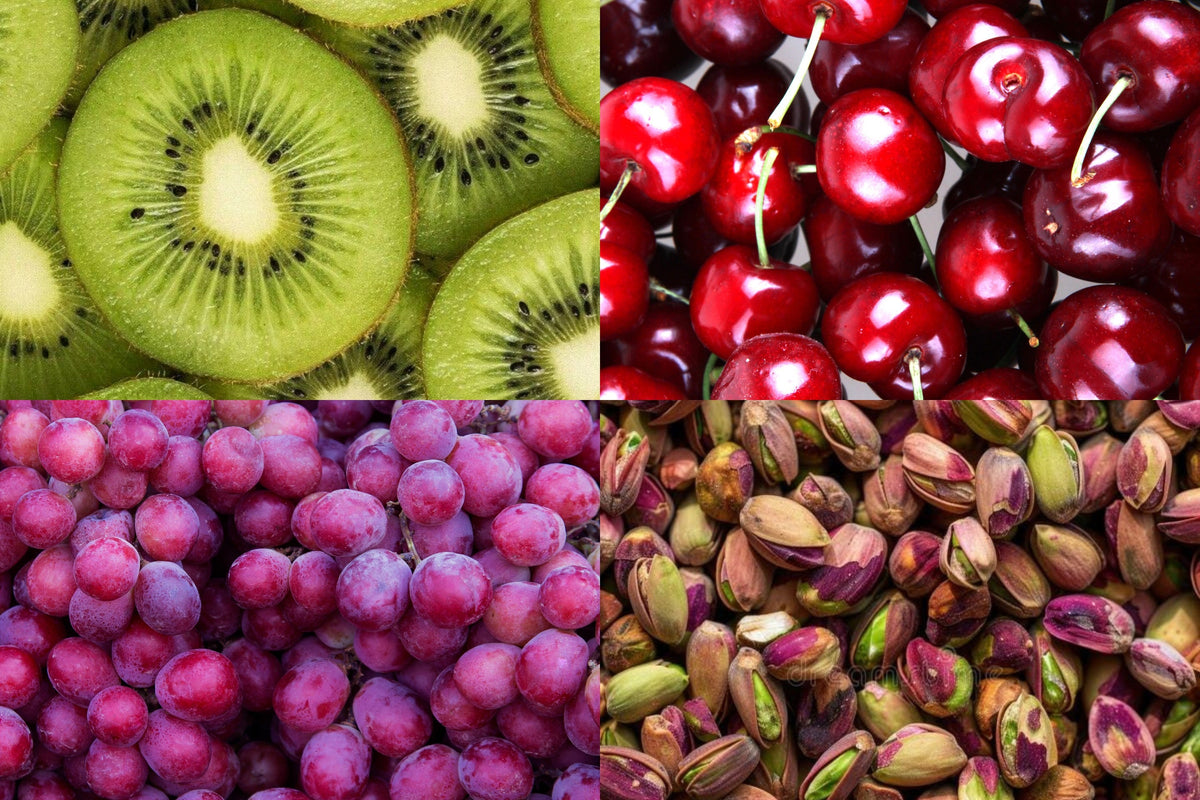
Four Foods That Naturally Support Melatonin and Better Sleep
|
|
Time to read 4 min
|
|
Time to read 4 min
Getting a solid night’s sleep isn’t just about a comfy mattress or switching off your phone—what you eat in the evening can influence how quickly you drift off and how refreshed you feel in the morning. Melatonin, the hormone that regulates your sleep-wake cycle, doesn’t only come from supplements. Many everyday foods contain compounds that help your body make or release it naturally.
By weaving these foods into your evening routine and creating a calming bedtime environment, you can give yourself a genuine head start toward better rest.
Melatonin production naturally rises as evening approaches, signalling your body that it’s time to wind down. Modern life—bright screens, artificial lighting, and late-night scrolling—can disrupt that process. Adding foods that contain or stimulate melatonin can help rebalance your internal clock without resorting to tablets or harsh sleep aids.
In the UK, many of these foods are easy to find year-round, and they slot effortlessly into normal snacks or light desserts. Pair them with other sleep-friendly habits—like a cooler bedroom and consistent bedtime—and the effects are even stronger.
Tart cherries, especially Montmorency varieties, are among the richest natural sources of melatonin. Research in the European Journal of Nutrition has shown that tart cherry juice can lengthen sleep duration and improve quality.
How to try it:
• Drink 150–200 ml of unsweetened tart cherry juice about 30–60 minutes before bed
.
• Prefer whole fruit? A small bowl of fresh or frozen sour cherries works just as well.
• For concentrate, dilute 1–2 tbsp as directed on the label.
Tart cherry juice is increasingly stocked in UK supermarkets and health shops—look in the chilled juice aisle or online.
The key is to choose unsweetened juice to avoid excess sugar spikes that can disturb sleep. Enjoying your glass while dimming the lights or slipping onto a SMUG Satin Pillowcase helps reinforce the signal that the day is winding down.
Among all nuts, pistachios stand out for their melatonin content. They’re also rich in magnesium, which can ease muscle tension, and vitamin B6, which your body uses to make serotonin (a melatonin precursor).
The easiest approach is to enjoy a small handful of unsalted pistachios after dinner. Unsalted nuts avoid excess sodium that can interfere with sleep quality. You can scatter them over yoghurt, pair them with a piece of dark chocolate, or eat them on their own as a satisfying alternative to biscuits.
Keeping a small jar on the counter makes it easy to reach for pistachios instead of sugary treats. Combine this with other calming cues—a cool bedroom or a SMUG Cloud Padded Sleep Mask—to create a multi-layered wind-down routine.
The skins of red and purple grapes contain naturally occurring melatonin. Eating a small bunch around 30–60 minutes before bed can provide a gentle nudge to your body clock.
• Choose seedless red or purple grapes, wash them, and chill for a refreshing snack.
• Skip grape juice, which often contains added sugar.
• Avoid using wine as a substitute—alcohol fragments sleep cycles and can leave you less rested.
Kiwi fruit brings two big advantages: serotonin and antioxidants. Studies suggest eating one or two kiwis about an hour before bed can reduce the time it takes to fall asleep and improve sleep quality.
Peel and slice them earlier in the day so they’re ready when you start winding down. Their natural sweetness satisfies a late-night craving without heaviness or refined sugar. Kiwi is widely available in UK supermarkets year-round, making this one of the simplest swaps you can try tonight.
• Plan ahead for consistency. Keep a small supply of cherries or kiwi in your weekly shop so you’re not tempted to skip your evening snack.
• Pair with calming drinks. A cup of caffeine-free chamomile or rooibos tea alongside pistachios or grapes can enhance your wind-down ritual without stimulating your system.
• Create a bedtime trigger. Using the same snack and setting—say, tart cherry juice in your favourite glass, lights dimmed, and your SMUG Satin Pillowcase—teaches your body to associate those cues with rest.
• Stay realistic. These foods aren’t instant sedatives. Think of them as gentle nudges for your body’s natural rhythms rather than quick fixes.
While these foods can help, they work best as part of a bigger picture. Here are a few easy, low-effort tips to pair with your evening snack:
Dim your lights about an hour before bed to mimic natural dusk.
Avoid bright screens or switch devices to night mode.
Lower your bedroom temperature slightly—cooler air encourages deeper sleep.
Use soft sleep accessories like a SMUG Satin Sleep Mask or Pillowcase to reduce friction on skin and hair and block any ambient light.
These small actions reinforce each other. Eating kiwi or cherries tells your body chemically that bedtime is near, while dim lights and a silky mask provide physical cues. Over time, the routine becomes second nature, and your sleep quality can noticeably improve.
No—rotate them based on what you enjoy or what’s in season. Even adding one or two regularly can help.
Studies show cherry juice has a positive effect on sleep without the risks of over-supplementation. Plus, it provides antioxidants and other nutrients.
Unfortunately, no. Alcohol may make you feel sleepy initially but reduces restorative sleep later. Stick to fresh grapes.
No single food is a magic bullet. Use these alongside other healthy practices—consistent bedtimes, reduced caffeine, and a calming sleep environment—for the best results.
Better sleep doesn’t always require drastic changes. A few thoughtful food choices—tart cherries, pistachios, grapes, or kiwi—combined with small environmental tweaks can help you fall asleep faster and wake up refreshed.
Tonight, swap your usual dessert for a handful of pistachios or a kiwi, dim the lights, and slip on your SMUG Cloud Mask. Small, simple steps can have a big impact on your sleep—without ever opening a supplement bottle.



